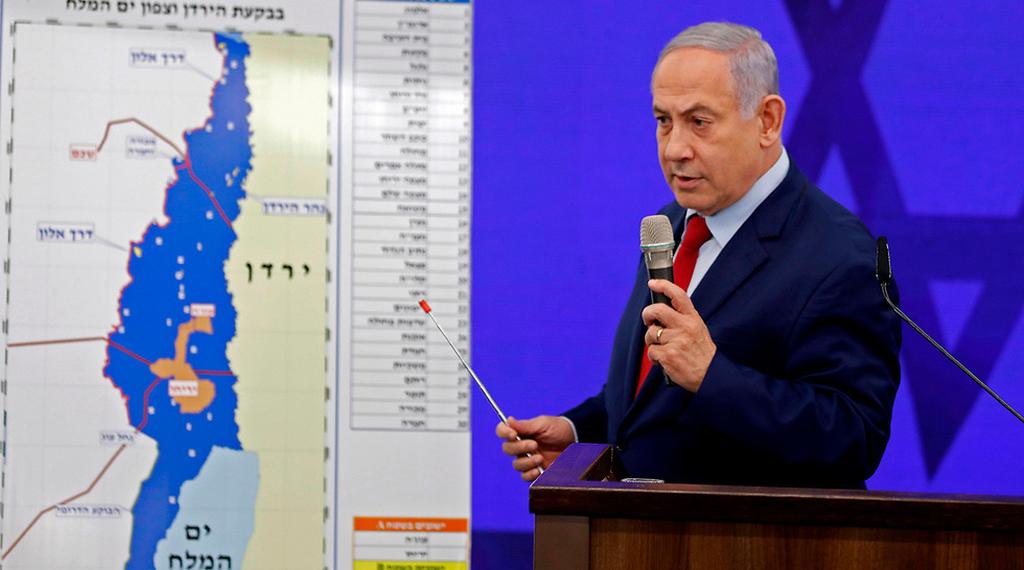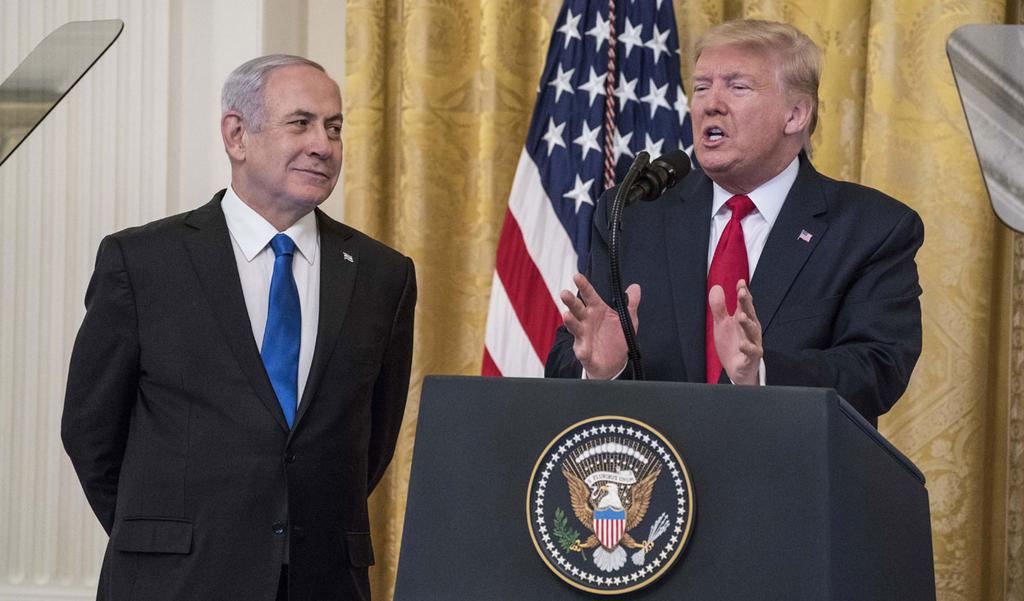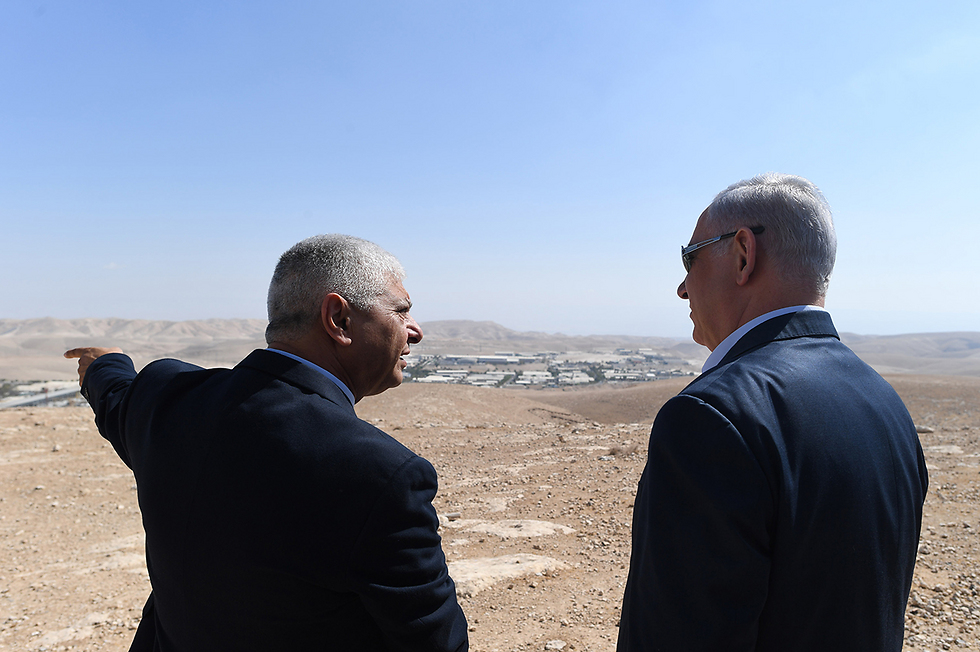With Prime Minister Benjamin Netanyahu eager to court the votes of the country's influential West Bank settlers, U.S. President Donald Trump's Mideast plan seemed to be the key to ramping up their support ahead of critical elections next week.
The plan envisions Israel's eventual annexation of its scores of West Bank settlements, a longtime dream of the region's settlers.
But in the weeks since it was unveiled, Netanyahu has stumbled over his promise to quickly carry out the annexation, sparking an outcry from settler leaders and threatening any goodwill he hoped to gain from the plan.
4 View gallery


Prime Minister Benjamin Netanyahu announcing his plan to annex the Jordan Valley
(Photo: AFP)
"If there is something that undermines the stability of the campaign in Netanyahu's eyes, it is attacks from the right," the columnist Mati Tuchfeld wrote in the pro-Netanyahu free daily Israel Hayom.
"It is not only the fate of the West Bank that is on the line, but his [Netanyahu's] political fate as well."
Israel heads to the polls for the third time in less than a year on Monday. The previous two rounds ended in deadlock, with neither Netanyahu nor his challenger, Benny Gantz able to secure a 61-seat Knesset majority.
Pre-election polls show a similar impasse emerging from the next vote.
Facing a corruption trial two weeks after the election, Netanyahu is desperate to remain prime minister, a position he can use to rally public support as he fights the charges.
In a bid to move the needle in his favor, Netanyahu has spent the final weeks of the campaign handing out political gifts to different constituents, with the Trump plan being the centerpiece of his strategy.
The plan, announced at the White House in late January to much fanfare, sides with Israel on most of the Israeli-Palestinian conflict's main sticking points.
Beyond granting Israel sovereignty over large parts of the occupied West Bank, it falls far short of the Palestinian dream of an independent state.
Instead, it calls for giving them limited autonomy over a disjointed archipelago of land, and only if they meet a stringent set of demands.
Seeing the plan as a green light, Netanyahu quickly pledged to steam ahead with the annexation plan, yet a cabinet meeting announced by his office never convened, with Netanyahu apparently reined in by officials at the White House who balked at his premature zeal.
Netanyahu has since tempered expectations on his annexation vow, fending off attacks from hard-liners by saying he must first map the territory with the Americans.
"We don't want to risk this, we are working responsibly and rationally," Netanyahu told his cabinet earlier this month, "to all those chirping in from outside and even from within the government, we did the work, and we will complete the work."
4 View gallery


Netanyahu stands with U.S. President Donald Trump as he unveils his Mideast peace plan, Jan. 28, 2020
(Photo: Getty Images)
Netanyahu and U.S. Ambassador to Israel David Friedman visited the West Bank settlement of Ariel on Monday with the Israeli-American mapping team.
Netanyahu said mapping the area will "allow the application of Israeli law on these territories, and in due course it will enable American recognition."
Israel captured the West Bank and East Jerusalem from Jordan and the Gaza Strip from Egypt in the 1967 Six-Day War.
The international community, including a string of U.S. presidents, has long opposed Israel's occupation of these areas, seeing it as an obstacle to peace, and Israeli settlements erected there as a way for Israel to that gobble up the land sought by the Palestinians for an independent state.
Trump though, backed by a team of Mideast advisers with close ties to the settlement movement, has taken a more lenient approach. His vision, with its tacit approval of Israel's settlements, sparked feverish calls from settlers for Israel to immediately annex parts of the West Bank, including more than 120 settlements which are home to nearly 500,000 Israelis.
Netanyahu's about-face has triggered a backlash among settler leaders, including some within his own party.
Settlers have erected a protest tent outside Netanyahu's Jerusalem office, and have staged protests while being outspoken in their criticism of the prime minister.
"Israel should impose sovereignty even if America doesn't agree," says settler leader Yossi Dagan, who has led the charge for annexation and is also an influential activist in Netanyahu's Likud party.
"This was a mistake and the prime minister must correct it."
While Netanyahu's enthusiasm for the plan is apparent, it has drawn criticism from even more hard-line settler supporters who believe it doesn't go far enough.
4 View gallery


A convoy of Jordan Valley farmers drives through the West Bank in support of Benjamin Netanyahu's annexation plan
While these same settlers support annexation, they oppose the establishment of the limited Palestinian state and the proposed creation of settlement "enclaves" surrounded by Palestinian territory, as they believe the creation of a Palestinian state - even in a weakened form - endangers Israel in the long term.
Also threatening Netanyahu is the fringe extreme-right political party Otzma Yehudit (Jewish Strength). The party, led by followers of the late racist rabbi Meir Kahane, who was expelled from Israeli politics over his views, has been Netanyahu's foil throughout the repeated election campaigns.
Jewish Power's leaders have rejected Netanyahu's calls for the party to drop out of the race, despite forecasts that it will not come close to reaching the threshold for entering the Knesset.
That means those votes, which could prop up Likud or the allied pro-settler Yamina party, are likely to go to waste.
The pro-settler vote is typically split between Likud, which mainly appeals to secular nationalists but also has a religious-nationalist cohort, and Yamina, where many settlers find an ideological home.
In a new gesture to the settlers, Netanyahu on Thursday promised to build thousands of new homes in the settlement of Ma'aleh Adumim on the outskirts of Jerusalem, including the last remaining open space that could potentially link Palestinian areas of the West Bank to the city.
4 View gallery


Prime Minister Benjamin Netanyahu with the mayor of the settlement of Adumim Ma'aleh, Benny Kashriel
(Photo: GPO)
While it's unclear whether the recent developments will harm Netanyahu, they have roused longstanding settler wariness of him, as many accuse him of making empty promises and not being committed enough to their cause.
"There is suspicion of Netanyahu over how much is he on our side," said Yair Sheleg, a research fellow at the Israel Democracy Institute.
"The question is, in the contest between between Likud and Yamina, what will they prefer?"
Eli Rosenbaum, a school principal who lives in the Ateret settlement, which under Trump's plan would be encircled by a Palestinian state, said he wasn't buying Netanyahu's pitch.
"Netanyahu's used [annexation] as an election spin, he quickly understood that he doesn't want to do it," Rosenbaum said from his kitchen, which overlooks a huge Palestinian flag rising from nearby newly built Palestinian town of Rawabi.
"The moment he thought that he received our support, he backed down."

